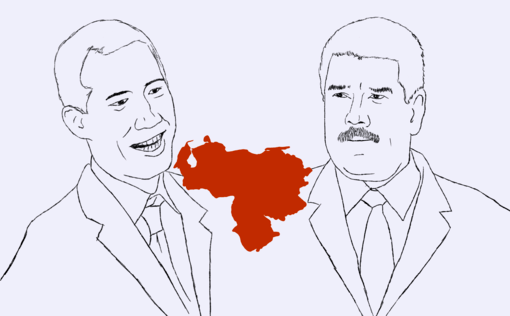
Drawing by Nathaniel St. Clair
In the weeks since Jose Guaidó declared to a crowd of supporters in Venezuela that he was the new president of Venezuela a lot has happened and very little has happened. Washington, Brazil and Colombia—three of the most right-wing governments in the Americas—unsurprisingly declared their support of Guaidó. Others followed. Indeed, it is more than reasonable to assume that it was the United States that not only encouraged Guaidó’s declaration but was intimately involved in preparing it. As much as been verified by numerous news articles and even a few statements from US Secretary of State John Bolton.
In essence, these actions by Guaidó, his supporters and the United States constitute an attempted coup. I say attempted because the process is ongoing. Many outside governments have registered their support for the move, but many others haven’t. Some governments and international agencies have even expressed their support for the legal and elected president Nicolas Maduro. Meanwhile, the US, UK and various other nations and banking institutions are preventing the elected government from obtaining its monies and simultaneously ramping up sanctions against those Venezuelans who support that government. Despite pressure from the United States, the Red Cross and other international aid agencies have refused to participate in politically motivated “attempts” to deliver aid to Venezuelans. One such attempt accompanied by photographs which purported to show semi-trailers blocking a bridge (and therefore aid) between Colombia and Venezuela was exposed as completely fraudulent. The photos proved to be photos of a bridge under construction.
One consistency between this and other attacks on the Bolivarian Project in Venezuela by the Venezuelan upper classes and their US backers is the attempts to portray the Venezuelan president as a dictator. In defense of their position, the opposition’s propaganda writers show pictures of soldiers along roads during demonstrations and relay numbers of people killed during these protests. Left unsaid is that many of the dead and injured are either military members or Bolivarian supporters killed and wounded by the opposition and its armed members. If Maduro is a dictator, how does one explain the fact of a strong, occasionally quite violent opposition being allowed to exist, run candidates in elections, and own major newspapers?
The nature of this coverage is to be expected by mainstream western media organizations. After all, their task is to provide the rationales for empire and intervention. It isn’t to examine the claims made by those in power and challenge them. So naturally, they will call Maduro a dictator and the Bolivarian government authoritarian and anti-democratic no matter what the facts are on the ground. What I find alarming however are those opposed to US intervention who spout these manipulations of the truth. It seems that very few statements from anti-intervention organizations and individuals do not include some kind of disclaimer that distances the writer, organization or speaker from the Maduro government. Many of these disclaimers call Maduro a dictator. Others have used essentially racist tropes by comparing Maduro to “the kind of guy who tied ladies to railway lines in silent movies.” (Robert Fisk, Independent)
There are those genuinely socialist writers and folks who understand their criticism of Maduro and the Bolivarian project to be in the spirit of socialist discourse. It is not these folks I have an issue with. While this may not be the best time to restart those debates, their conversation is part of an ongoing discussion within the international left. No, it is those who are opposed to US intervention in Venezuela but tend to emphasize how much they do not like Maduro as much if not more than their opposition to the coup and sanctions. I can’t help but be reminded of the proverb: “Those who live in glass houses should not throw stones.”
In other words, if one doesn’t consider the United States to be a dictatorship then they would be hard-pressed to label Venezuela as such. The only reasoning that would allow this distortion would be one that sees the United States as an exception to the rest of the world. It would be a perception that ignored the fact of Trump’s installation in the White House despite losing the popular vote. It would be a perception that ignored the fact that the US Senate guarantees an unequal representation that has historically granted the monied right-wing elements of the US polity more power than the majority. It is a perception that ignores the fundamental inequality based on class and race that is part and parcel of US history. In other words, it is American exceptionalism, a myth that too many on what passes for the US Left have accepted as reality..